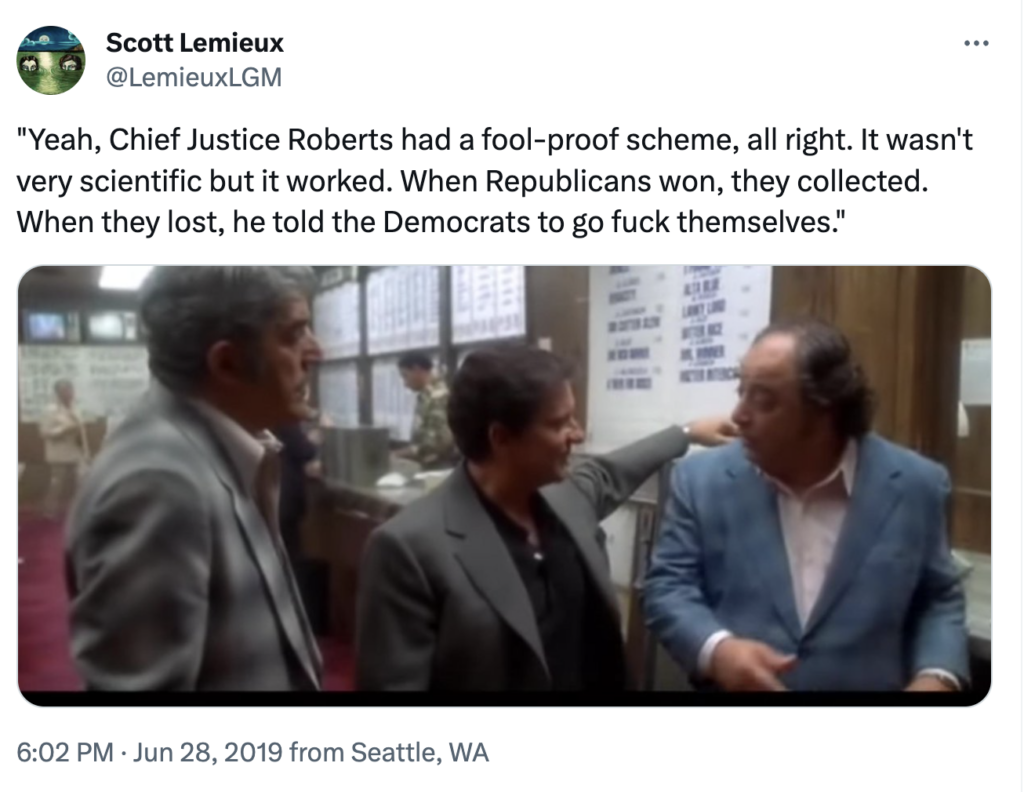John Roberts to fulfill lifelong dream of fully nullifying the Voting Rights Act

This is one of those cases where the question the Court granted cert to answer tells you what the answer will be, and in this case the answer will be “the Reconstruction Amendments have passed their sell-by date, unless they can be cynically be deployed against the rights of African-Americans”:
The Supreme Court appeared poised on Wednesday to upend a key provision of a landmark civil rights law by prohibiting lawmakers from using race as a factor in drawing voting maps, which could spark widespread redistricting efforts.
If the justices determine that lawmakers may not consider race in drawing districts, the repercussions for the country’s political balance could be sweeping, allowing Republican state legislatures to eliminate at least a dozen Democratic-held House districts across the South.
It’s not clear how fast any redistricting could happen. The court typically issues major rulings by late June or early July, and the next major vote is the 2026 midterm elections in November.
The case examines whether Louisiana lawmakers violated the Constitution when they adopted a new electoral map in 2024, creating the state’s second majority-Black district. It challenges a key provision of the Voting Rights Act of 1965.
During the oral argument, several of the court’s conservative justices appeared focused on whether there should be a time limit for allowing race to be used as a factor in congressional maps, a requirement that stemmed from civil rights era protections aimed at undoing generations of efforts to suppress the power of Black voters.
“This court’s cases, in a variety of contexts, have said that race-based remedies are permissible for a period of time — sometimes for a long period of time, decades, in some cases — but that they should not be indefinite and should have an end point,” said Justice Brett M. Kavanaugh, who is expected to be a key vote on the issue.
“What exactly do you think the end point should be?” Justice Kavanaugh then asked a lawyer for the NAACP Legal Defense Fund, who argued to uphold the Voting Rights Act.
“The way to stop discriminating on the basis of race is to stop caring about whether states discriminate on the basis of race after some arbitrary time period that happens by pure coincidence to advance the electoral interests of the Republican Party.”
Legally, this is a perverse argument. The Reconstruction Amendments were adopted to end slavery and provide Black people with equal rights, including the right to vote. To use those same amendments as weapons of white supremacy today is not just legally incorrect—it is a tragedy.
The justices may want to focus on theoretical questions of how to apply the Constitution’s promises of a right to vote and the equal protection of the laws, as their framing of the arguments suggest. But the case isn’t just an academic dispute. It’s actually a case about facts, even if they may be largely absent from Wednesday’s oral arguments and the majority’s eventual opinion. The non-Black voters and their lawyers claim Section 2’s requirements burden states with intrusive federal oversight that is unjustified by current conditions. And so the question is, on their terms, if the state of Louisiana and the others have moved so far beyond where we were in 1965 that this law is no longer warranted.
To ask Black people in Louisiana, the answer is clearly no. Take an amicus brief from the Louisiana Legislative Black Caucus, an association of state legislators, which details case after case of discrimination against their members and Black voters in the state. “Black candidates face both open and subtle racial indignities when campaigning and some have observed that open racism has only increased in recent years,” the brief states. “Without this vital bulwark against anti-Black policies and practices, ongoing efforts to gerrymander and dilute the Black vote will proceed uninterrupted. Black voters will be deprived of their right to meaningfully participate in the political process, plunging Louisiana into a new era of racial ignominy.”
Somewhere in hell, James McReynolds is smiling.


